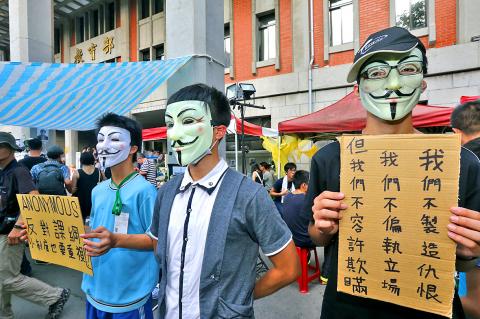Academics yesterday urged the government to make concessions in its tug-of-war with students protesting against its changes to high-school curriculum guidelines, saying it was the only way to peacefully break the current stalemate.
Hundreds of student protesters broke through a police barricade in front of the Ministry of Education compound in the early hours of Friday and occupied the forecourt, demanding that the ministry withdraw the guidelines, which they describe as having undergone “China-centric” revisions in a process that was not transparent. The students’ occupation of the site entered its 60th hour at noon yesterday.
“The impasse between the government and student protesters is only likely to ease if the former makes concessions and goodwill gestures,” Academia Sinica Institute of Sociology researcher Michael Hsiao (蕭新煌) said.

Photo: CNA
Hsiao said the scheduled extraordinary legislative session tomorrow would serve as a good opportunity for such a move, preferably an announcement by Minister of Education Wu Se-hwa (吳思華) of his resignation.
Students’ ongoing participation in the movement against the contentious curriculum adjustments were well-founded, Hsiao said, given that the ministry had failed to give a convincing explanation regarding its decision to make changes to the curriculum.
“Judging from the current situation, it is almost impossible for the students to back down and leave... Having Wu step down would be a more feasible first step into imposing a hiatus on the protest and allowing it to temporarily cool off,” Hsiao said.
Another sociology researcher at the institute, Hsiau A-chin (蕭阿勤), said it would be wise for the government to adopt a more delicate approach to the movement and open itself to genuine dialogues with the participants, who appeared to have become radicalized.
“Many student-led movements in the past died down because they coincided with schools’ midterm or final exams that weakened the protesters’ momentum, but there is still a month before school starts,” Hsiau said.
To prevent the current movement from spiraling out of control, those in power should listen and make compromises, Hsiau added.
“Otherwise, no one can tell how divided our country will become if the ministry wins the lawsuit against students who stormed into Wu’s office on July 23,” Hsiau said.
Meanwhile, National Taiwan University Department of Sociology professor Ho Ming-sho (何明修) said the manner in which the Chinese Nationalist Party (KMT) politically calculated and took advantage of the recent death of student protester Dai Lin (林冠華) to prop up its presidential campaign has crossed a moral boundary.
Lin, a member of the Northern Taiwan Anti-Curriculum Changes Alliance, apparently committed suicide at his family’s residence in New Taipei City on Thursday last week.
“It is up to the KMT, the nation’s ruling party, to decide how to clean up this mess. The way the party asked Democratic Progressive Party Chairperson Tsai Ing-wen (蔡英文) to take responsibility for Lin’s death was a politically motivated move,” Ho said.
Ho said whether tomorrow’s extraordinary session would be held as scheduled hinged solely on the KMT’s attitude.
“Remember, the participants in last year’s student-led movement against a cross-strait service trade agreement only agreed to leave following a 24-day occupation of the Legislative Yuan’s main chamber after Legislature Speaker Wang Jin-pyng (王金平) made concessions that were not made by President Ma Ying-jeou (馬英九),” Ho said.
“They left because they felt goodwill from the government,” he said.

An essay competition jointly organized by a local writing society and a publisher affiliated with the Chinese Communist Party (CCP) might have contravened the Act Governing Relations Between the People of the Taiwan Area and the Mainland Area (臺灣地區與大陸地區人民關係條例), the Mainland Affairs Council (MAC) said on Thursday. “In this case, the partner organization is clearly an agency under the CCP’s Fujian Provincial Committee,” MAC Deputy Minister and spokesperson Liang Wen-chieh (梁文傑) said at a news briefing in Taipei. “It also involves bringing Taiwanese students to China with all-expenses-paid arrangements to attend award ceremonies and camps,” Liang said. Those two “characteristics” are typically sufficient

A magnitude 5.9 earthquake that struck about 33km off the coast of Hualien City was the "main shock" in a series of quakes in the area, with aftershocks expected over the next three days, the Central Weather Administration (CWA) said yesterday. Prior to the magnitude 5.9 quake shaking most of Taiwan at 6:53pm yesterday, six other earthquakes stronger than a magnitude of 4, starting with a magnitude 5.5 quake at 6:09pm, occurred in the area. CWA Seismological Center Director Wu Chien-fu (吳健富) confirmed that the quakes were all part of the same series and that the magnitude 5.5 temblor was

The brilliant blue waters, thick foliage and bucolic atmosphere on this seemingly idyllic archipelago deep in the Pacific Ocean belie the key role it now plays in a titanic geopolitical struggle. Palau is again on the front line as China, and the US and its allies prepare their forces in an intensifying contest for control over the Asia-Pacific region. The democratic nation of just 17,000 people hosts US-controlled airstrips and soon-to-be-completed radar installations that the US military describes as “critical” to monitoring vast swathes of water and airspace. It is also a key piece of the second island chain, a string of

The Central Weather Administration has issued a heat alert for southeastern Taiwan, warning of temperatures as high as 36°C today, while alerting some coastal areas of strong winds later in the day. Kaohsiung’s Neimen District (內門) and Pingtung County’s Neipu Township (內埔) are under an orange heat alert, which warns of temperatures as high as 36°C for three consecutive days, the CWA said, citing southwest winds. The heat would also extend to Tainan’s Nansi (楠西) and Yujing (玉井) districts, as well as Pingtung’s Gaoshu (高樹), Yanpu (鹽埔) and Majia (瑪家) townships, it said, forecasting highs of up to 36°C in those areas